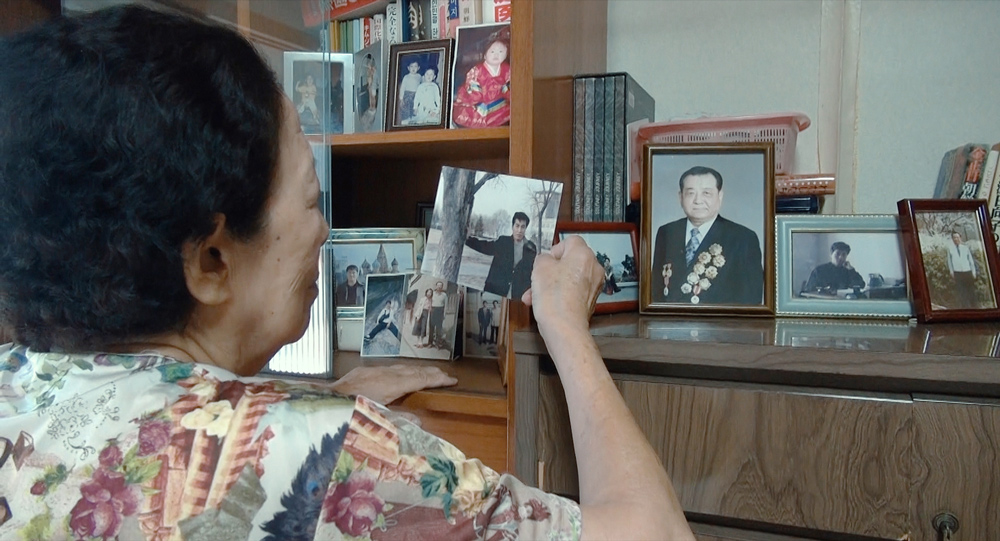!["Soup and Ideology" Director Yang Yong-hee Depicts the moment when a mother's cooking transcends nation and ideology [Director's Interview Vol.213]](https://cinemore.jp/images/c86b00427d16ed745a59904b08191236359695d95d391af575704c2f6a5467a4.jpg)
"Soup and Ideology" Director Yang Yong-hee Depicts the moment when a mother's cooking transcends nation and ideology [Director's Interview Vol.213]
Director Yang Yong-hee has made documentaries such as ` `Dear Pyongyang '' (2005) and `` My Love Sona '' (2009) that depict the feelings of the brothers and their families who went to North Korea, as well as the conflicts of their parents who sent them away. Furthermore, in 2012, he succeeded in turning his experiences into a feature film, `` Kazoku no Kuni .''
Her latest work is ``Soup and Ideology,'' which focuses on her mother's life. The key to this work is the ``Jeju April 3 Incident'' that occurred in 1948. After being liberated from Japanese colonial rule, the peninsula was divided between the United States and the former Soviet Union. In South Korea under U.S. military rule, an attempt was made to hold a separate election in the south, but there was strong opposition from the people who argued that it would lead to division. Opposition to a separate election was particularly strong on Jeju Island, and in an attempt to suppress this opposition, the South Korean military committed mass murder of the island's residents. It is said that as many as 30,000 people were murdered on an island the size of Osaka Prefecture. Director Yang's mother had experienced this incident.
Director Yang aims his camera at his mother, who had sealed away her memories of the horrific incident, and attempts to free her by digging up those memories and passing them on to the next generation as a work. This work also presents the possibility that family activities, symbolized by soup, can overcome national and ethnic ideologies. Although it is a minimalist film that expresses the life of a family, it also asks the question of what a nation or ethnicity is. This is an excellent work that asks a strong question.
By asking director Yang to talk about the production process, the meaning of this film became clearer. I hope you enjoy this article along with the movie.
Index
- At first I had no intention of photographing my mother.
- Thoughts on the Jeju April 3 Incident
- Her husband's presence is the driving force behind the film.
- The moment when my mother's soup transcended ideology
- The meaning of conveying painful memories to others
- A miraculous image captured by close contact
- husband as producer
At first I had no intention of photographing my mother.
Q: ``Soup and Ideology'', like `` Dear Pyongyang '' (2005), has a scene in the first half of the movie where director Yang sits around the dinner table with his parents.
Yang: That's footage taken from " Dear Pyongyang ."
Q: I was impressed by how you depicted your father's life in " Dear Pyongyang " and your mother's life in this film. What made you decide to portray your mother in this work?
Jan: If anything, I didn't want to photograph my mother. My father was kind to me, and I was also a father's child, which is why I think I was able to film `` Dear Pyongyang .''
Q: In Dear Pyongyang , your father was smiling all the time.
Jan: I think my parents were wary when I had a camera. My daughter is someone who openly reveals everything about her family, so I think she decided not to say anything about her family in front of the camera.
Still, the father is kind to his daughter and ends up revealing his true feelings. When I turned on the camera while reporting on the abduction issue on TV, my father's eyebrows furrowed and he looked like, ``I wish I hadn't done that...'' However, my mother disappears from the scene. I'm very good at shutting out information that I don't want to hear. When I saw my mother like that, I thought, ``She's cheating.'' However, I also think that it is ``as expected'' in terms of how to manage one's life. Perhaps they thought that by avoiding seeing the bad parts, they could somehow continue to believe in North Korea.

“Soup and Ideology” (C) PLACE TO BE, Yang Yonghi
Q: Director Yang's three older brothers traveled from Japan to North Korea in the 1970s on a "repatriation project." The mother visited her sons living in North Korea many times.
Yang: My mother traveled to North Korea more times than my father. My father was visiting North Korea as part of a delegation from the Federation of Korean Federations, while my mother went to North Korea on a family visit, bringing lots of clothing and medicine, and staying in an apartment for an extended period of time. I have lived with relatives in the countryside for long periods of time, so I know the true state of North Korea very well. Still, my mother didn't talk about such things at home, and she definitely wouldn't say it in front of the camera. That's why I thought, ``It might be impossible to capture my mother's true feelings.'' (lol).
Also, in `` Dear Pyongyang ,'' my father spoke in front of the camera of his true feelings about sending his brothers back to North Korea, and after that, I shot the feature film `` My Family. '' I heard that this was a problem within the Chosun Federation. I didn't want to worry about the safety of my brother in North Korea any longer because of my work. That's why I decided to stop making family documentaries. But on the other hand, ``April 3'' (Jeju April 3rd Incident) was stuck somewhere in my mind, like unfinished homework.
Thoughts on the Jeju April 3 Incident

